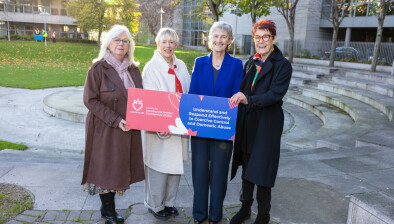Judges and lawyers ‘lack understanding’ of domestic abuse in family law system

Judges, lawyers and court staff need to better understand domestic violence and abuse to prevent the “secondary victimisation” of victims and survivors, a new report into the Irish family law system has said.
Women’s Aid commissioned researchers at Trinity College Dublin and University College Cork to carry out a first-of-its-kind study into how victim-survivors of domestic violence and abuse (DVA) experience navigating the Irish family law system in guardianship, custody and access cases.
The 405-page report published yesterday sets out their findings, based on court observations, surveys, interviews and focus groups with children, aged-out minors, adults, domestic violence practitioners, health, social care and legal professionals and judges.
It argues that the family law system is not sufficiently DVA-informed or -responsive, including because many legal professionals, mediators, court accessors, barristers and judges lack a fundamental understanding of the dynamics and impacts of domestic abuse including coercive control, and its impacts on adult and child victim-survivors.
Women’s Aid says this “systemic blind spot leaves victims feeling disbelieved, silenced and at risk from further abuse”.
The report says the ongoing reform of the family law system “presents an important opportunity to ensure that DVA is always a consideration in guardianship, custody and access cases… guided by the principle that exposure to DVA constitutes child abuse and that supporting the victim-survivor parent is the best form of child protection in such cases”.
Sarah Benson, CEO of Women’s Aid, said: “This research is very difficult but required reading for anyone who plays any part in the family justice system.
“It provides a picture of the horrendous abuse and control that adult and child victim-survivors have experienced during the relationship, while trying to leave and post-separation. It captures hundreds of reports of physical, emotional, economic and sexual abuse of women, men and children.
“It tells us that sadly even where there are some examples of informed and understanding practices among some key individuals, this is completely inadequate when the system itself is not attuned and responsive to the tactics and impacts of domestic abuse post-separation.
“Participants in the research spoke of having to adhere to court ordered access to avoid being charged with violating a court order, requiring them to regularly engage with their abuser. This frequently provided court sanctioned opportunities for further abuse to occur.
“The research holds a mirror up to the reality of many families lives marred by domestic abuse and challenges us to do better.”
Two-thirds of adult victim-survivors reported that judges fail to take their experiences of domestic violence and abuse into account when making decisions about guardianship, custody, and access involving the perpetrator.
Adult survivors report being put into the impossible position of having to adhere to court-ordered custody and access arrangements that placed their children in harm’s way or face penalties.
Other major issues identified in the report include lack of access to legal representation, time to consult and prepare for cases, huge financial burdens, and a system generally overwhelmed by volume and pressure of cases.
Professor Stephanie Holt from the School of Social Work and Social Policy at Trinity College Dublin was the principal investigator for the research.
“Despite the disproportionately high prevalence of domestic violence and abuse in family law cases alongside ongoing safety and welfare concerns in these cases, there has been limited robust research evidence on how the journey through the family law system is experienced by adult and child victim-survivors of abuse,” she said.
“This groundbreaking study provides a comprehensive 360-degree understanding of that journey and shows that the current operation of family law system for victim-survivors is serving to increase risk, undermine rights and compromise safety.
“It provides evidence and insights into a fundamentally flawed family law system when dealing with adult and child victim-survivors of domestic abuse including coercive control.
“The findings paint a predominantly negative picture of that journey through the family law system for adult and child victim-survivors of domestic violence and abuse. That negative picture is highly critical of the processes, procedures and practices within the family law system.
“Importantly the report makes a range of recommendations to improve the family law system to make it safer for adult and child victim-survivors. Our research also found that when adult and child victim-survivors engaged with professionals whose practice reflected an understanding of domestic violence and abuse, this experience was transformative.
“We are indebted to the many victim-survivors and professionals who took part in this vital research.”










